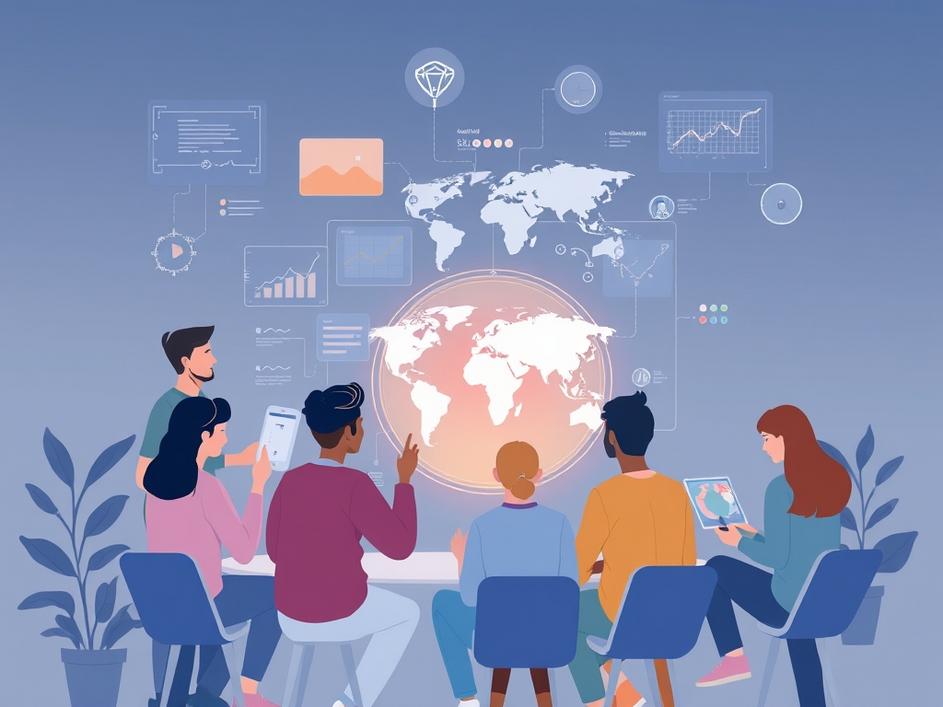


We are a digital agency helping businesses develop immersive, engaging, and user-focused web, app, and software solutions.
2310 Mira Vista Ave
Montrose, CA 91020
2500+ reviews based on client feedback

What's Included?
ToggleWe all talk about artificial intelligence a lot these days. It pops up in our everyday lives, from the suggestions we get online to how smart devices work in our homes. There’s a real buzz around AI – the incredible things it can do, like making complex tasks easier or creating amazing digital content. But with all that excitement, there’s also a natural concern. We wonder about its bigger impact, how it might change jobs, or if it will always be used for good. It’s a powerful tool, and like any powerful tool, its true value comes down to how we choose to use it. This ongoing conversation about AI’s role in our future is why some news caught my eye recently. It wasn’t just another story about a new AI feature; it was about something much bigger: a real effort to guide AI towards making our world genuinely better. This story focuses on a generative AI video platform called PixVerse teaming up with the United Nations University (UNU) to start something called the “AI for Good Academy.” It’s a move that feels like a significant step in making sure AI serves a higher purpose, bridging the gap between cutting-edge technology and global well-being.
When we hear “AI for Good,” it sounds nice, but what does it actually mean? At its heart, it’s about being intentional. It means actively thinking about how AI can help solve some of the world’s biggest and toughest problems. Think about climate change, health issues, hunger, or giving everyone a fair chance. Instead of just letting AI develop on its own path, the “AI for Good” movement wants to steer it towards solutions for these challenges. It’s about more than just making things efficient; it’s about making them equitable and sustainable. For example, can AI help us predict natural disasters better? Can it speed up medical research? Can it create educational tools for communities that don’t have many resources? These are the kinds of questions this movement tries to answer. The partnership between PixVerse and UNU is a concrete way to push this idea forward. It’s not just talk; it’s about creating a structured way to educate people and build projects that embody this spirit.
So, where does a generative AI video platform like PixVerse fit into all of this? Generative AI, especially for video, is an incredibly powerful storytelling tool. Imagine being able to create engaging, high-quality videos without needing a huge budget, expensive equipment, or a team of experts. This capability has huge implications for spreading important messages. For example, an NGO trying to raise awareness about clean water initiatives in a remote village could use AI to quickly produce compelling videos that explain the issue and show solutions. A public health organization could create easy-to-understand animated explainers about disease prevention. Education, too, gets a big boost. Teachers could make custom learning materials that are visually rich and exciting, tailored to their students’ specific needs. Video cuts through language barriers and captures attention in a way that plain text often can’t. By making advanced video creation more accessible, platforms like PixVerse don’t just offer a cool new tech toy; they offer a new way for stories of impact to be told and shared widely, giving a voice to initiatives that truly matter.
The core of this partnership is the “AI for Good Academy.” This isn’t just a fancy name; it’s designed to be a hub for learning and doing. The idea is to teach people not just how to use AI tools, but how to use them responsibly and ethically to address real-world problems. Think of it as a classroom where the lessons are about both technology and morality. People will learn the practical skills needed to work with generative AI, but they will also explore the ethical questions that come with it. How do we make sure AI is fair? How do we prevent bias? How do we use it in a way that respects privacy? The academy aims to develop a community of practice, bringing together researchers, policymakers, developers, and regular citizens. It will be a place where new ideas are tested, guidelines are discussed, and projects aimed at positive social change are nurtured. It’s about building capacity across the globe, empowering individuals and communities with the knowledge and tools they need to harness AI for their own specific challenges, ensuring the benefits of AI are widely shared and not just concentrated in a few hands.
For me, this collaboration is a big deal because it brings together two very different but equally important worlds: cutting-edge technology and ethical global governance. Often, new tech moves so fast that policy and ethics struggle to keep up. This partnership with the United Nations University provides a crucial counterbalance. UNU’s involvement adds a layer of responsibility and a global perspective that is vital. It means that the “AI for Good Academy” won’t just be about building cool tech; it will be about building *responsible* tech that serves humanity. It’s a clear signal that the future of AI isn’t just about making cooler apps or better business tools, but about making a better world for everyone. This kind of collaboration is what we need more of. It helps democratize AI knowledge, making these powerful tools and the understanding of how to use them available to more people, not just a select few. When more people, from different backgrounds and with diverse needs, can access and understand AI, the potential for truly innovative and impactful solutions multiplies. This initiative truly represents a proactive step towards ensuring that AI’s evolution is guided by principles of inclusion, sustainability, and human well-being.
In a world often filled with worries about technology’s rapid progress, this “AI for Good Academy” offers a very hopeful outlook. It reminds us that AI isn’t just a force to be feared or simply a tool for profit. It can be a powerful ally in building a better future, provided we choose to direct its capabilities with care and purpose. The partnership between a creative tech company like PixVerse and a respected global institution like the UNU is a fantastic example of what’s possible when innovation meets intention. It’s about creating a world where AI doesn’t just make our lives more convenient, but genuinely contributes to solving big problems and fostering a more just and sustainable planet. This is a call to action for all of us, a reminder that the future of AI is still being written, and we all have a role in shaping its story for the good of everyone.



Comments are closed